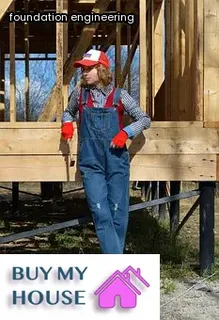When it comes to the foundation of your home, understanding the basics and properly inspecting it is key. To start, foundations can be made out of poured concrete, masonry or wood — each of which come with their own pros and cons.
Poured concrete is the most stable and reliable option but is also costlier than other materials. Masonry is typically composed of brick or stone, while wood is usually used for older homes.
It's important to be aware that any material can have issues if there's a problem with the grade or soil around the house itself. Once you're familiar with what type of foundation you have, you'll need to inspect it for cracks or damage in order to keep your home safe from structural problems.
This can involve looking at both the interior and exterior walls for signs of deterioration as well as checking for signs of water damage like mold or rust. Depending on what type of foundation you have, there may be more specific things to look out for so research accordingly before conducting an inspection.
Overall, having a strong foundation is essential for any home so take the time to properly inspect yours in order to ensure its stability and safety.

Having your home’s foundation inspected is a necessary part of home maintenance that should not be overlooked. It is important to inspect the foundation of your home regularly in order to identify any potential issues before they become bigger, more expensive problems.
There are several reasons why it is beneficial to have your home’s foundation inspected. Firstly, inspecting the foundation can help detect any structural damage or deterioration that may have occurred over time, due to erosion or other factors.
Secondly, it can identify if there are any cracks in the foundation which can lead to water infiltration and other issues if left untreated. Thirdly, an inspection can determine whether there are any gaps between the foundation and the framing of your house which could be caused by settlement or shifting of the ground beneath your house.
Lastly, an inspection can provide peace of mind that your home’s foundation is secure and stable so you don’t need to worry about irreversible damage occurring down the line. Regular inspections of your home’s foundation are essential for ensuring its safe and long-lasting operation.
Before you can properly inspect the foundation of your home, it is important to take the necessary steps to get ready for the inspection. It is recommended that you start by doing some research so that you understand what to expect from an inspection and how to prepare for it.
Start by speaking with a trusted contractor who can provide advice on any potential issues they may find while inspecting your foundation. Additionally, make sure to create a plan to access all areas of your foundation as some areas may be difficult to reach or have limited access.
Make sure to clear away any debris or clutter that might obstruct the view of the inspector, and if possible, turn off any water sources that could interfere with the inspection process. Finally, take notes throughout the process and ask questions about anything you don't understand or are unsure about.
Doing this will help ensure that you are prepared for your home's foundation inspection.

Inspecting the foundation of your home is an important part of ensuring its structural integrity and safety. To thoroughly check your foundation, you'll need to look for cracks, bulges, and other signs of damage.
Begin by examining the exterior walls from the outside of your home. Look for any apparent cracks in the brickwork or mortar joints, as well as any unevenness in the surface.
You should also inspect areas around windows and doors for signs of damage that could indicate a problem with the foundation. Additionally, make sure to look for any water intrusion or pooling near your foundation.
Next, inspect the interior walls of your home for any evidence of bowing or cracking. Pay special attention to corners and joints where two walls meet as those are most vulnerable to settling foundations.
Finally, use a flashlight in crawl spaces and check for any sagging beams or joists that could be indicative of weak support structures due to shifting foundations. By following these steps, you can ensure that your home's foundation is secure and stable before costly repairs become necessary.
Inspecting the foundation of your home is not a task to be taken lightly, and it's important to know when to contact a professional. If you have any doubts or concerns about the integrity of your foundation, it’s always best to enlist the help of an expert.
A qualified professional can accurately assess any damage, as well as explain all necessary repair work and potential costs involved. Furthermore, they will be able to advise you on preventative measures such as waterproofing, drainage systems, and other methods that may reduce future damage.
In short, if there is any sign of damage or suspected structural issues with your foundation, it’s wise to seek help from an experienced professional who can provide you with detailed information and peace of mind.

Finding the right professional to inspect your home's foundations is essential for ensuring the correct assessment and repairs are made. Before you select a contractor, research their credentials and certifications, read reviews from past customers, ask for references, and check if they are properly insured.
Make sure they specialize in foundation repair and have extensive experience working with projects similar to yours. It is also important to get an estimate ahead of time so that you can compare costs between different professionals.
When interviewing prospective contractors, ask detailed questions about the materials used for repairs and what their process looks like. Be sure to inquire about how much time the job will take and any cost-saving measures that may be available.
With a little due diligence, you can find a reliable professional who will perform a thorough inspection of your home's foundation and provide quality repairs at an affordable price.
Foundation inspections are an absolutely essential part of owning and maintaining a home, however it is best to rely on professionals for this task. A professional foundation inspector will use specialized tools and techniques to ensure that the entire foundation of the home is properly assessed, including checking for signs of structural damage or water infiltration.
Catching any issues early on will save you time and money in the long run since they can be repaired quickly and easily before they become major problems. Foundation inspectors also have the experience necessary to recognize potential problems that may not be visible to the untrained eye.
Taking advantage of their expertise can help you avoid costly repairs down the road.

If your home inspection reveals that you need extra support for the foundation of your home, you may want to consider a dumpster rental. This is an ideal solution for anyone who needs to dispose of excess materials or debris from repairs.
Dumpster rentals come in various sizes and capacities, so it is important to choose one that best fits your needs. It is also important to keep in mind local regulations when renting a dumpster, as there can be restrictions on where they can be placed.
Renting a dumpster not only provides you with a convenient way of disposing materials and debris, but it can also help expedite the process of inspecting and repairing the foundation of your home.
When considering the costs associated with a home foundation inspection, it is important to weigh the pros and cons of undertaking such an endeavor. Generally speaking, a foundation inspection will include an assessment of the integrity of the structural elements as well as any potential signs of damage or deterioration.
Depending on the size and condition of your home’s foundation, this may require additional services such as excavation and evaluation by a professional contractor. Additionally, any necessary repairs may incur significant expenses, so it is wise to factor in potential repair costs when evaluating how much you are willing to spend on an inspection.
Of course, if left unchecked, failing foundations can lead to serious issues down the line which could cost more money in the long run, thus making regular inspections key for ensuring that your home’s foundation remains in good condition and safe from costly damage or deterioration.

It is important to be aware of the warning signs of foundation damage when inspecting the foundation of your home. Early detection of any potential problems can save you a lot of money, time and stress in the long run.
Look for cracks in both interior and exterior walls, bowing or buckling walls, windows or doors that become difficult to open or close, sloping floors, sticking windows and doors, gaps between walls and ceilings or floors, and water seeping through foundation walls. Checking around the perimeter of your home for any changes in soil level can also help identify potential issues with the foundation.
You may want to periodically inspect your foundation if you live in an area with expansive soils which can cause movement in the structure if not properly supported. Investigate any changes to the adjacent land such as new construction projects that could potentially cause disruption to your property's foundation as well.
Being aware of these warning signs will go a long way towards protecting your home's foundation from further damage.
When inspecting the foundation of your home, it is important to look for cracks in the exterior walls. Common causes of wall cracks include foundation settlement, soil erosion, and water damage.
To troubleshoot and repair these common issues, thoroughly examine the area around the crack to determine the source and severity of the problem. Make sure to check for signs of water intrusion such as efflorescence or mold.
To further investigate any potential problems with your exterior wall, you can use specialized tools such as a moisture meter or infrared thermometer. Additionally, take note of any bowing or bulging in the wall, which could indicate that there is too much pressure inside the wall cavity due to soil expansion.
It may be necessary to have a professional come out and inspect your home if you suspect there may be more serious structural problems with your foundation walls.

It is important to be aware of warped siding when it comes to properly inspecting the foundation of your home. If you notice any warping or buckling, it could be an indication that there are structural issues with your home's foundation.
Warped siding can be caused by a variety of factors, including water damage, inadequate insulation, improper installation, and exposure to extreme temperatures. It is recommended that homeowners inspect their siding at least once a year for signs of warping or other damage.
If you notice any changes in the condition of your siding, especially if it appears to be buckling or warping, you should address the issue as soon as possible. A professional inspector may be able to determine whether the issue is a cosmetic problem or something more serious that requires repair.
Paying attention to signs of warped siding can help protect your home from more serious problems down the line and ensure its structural integrity.
Maintaining the foundation of your home is an essential part of protecting your investment. Regular inspections can help detect signs of damage before they become more serious and expensive to repair.
Knowing how to properly inspect the foundation is a key part of keeping your home safe and secure. By scheduling regular inspections, you can be sure that any potential issues that may arise are caught early, reducing the risk of costly repairs in the future.
Additionally, regular maintenance can help keep your home structurally sound and increase its value over time. Inspections should include checking for cracks in walls or floors, water damage, movement or settling in the foundation, and any other signs of deterioration or weakness.
Taking proactive steps like these can save you time and money down the road while helping to ensure that your home remains safe and secure for years to come.

If you suspect that there may be serious problems with the foundation of your home, it is important to take action now and inspect it. Start by checking for any visible signs of damage or cracking in the foundation walls, both inside and outside the home.
Pay particular attention to any areas around doors and windows where settling may have occurred. Also inspect around any plumbing penetrations or leaking pipes which could cause water to seep into the foundation and result in cracking or other structural damage.
If a crack is found, make sure to measure its length as well as its width so that you can determine if it has changed over time. Additionally, look for any signs of shifting such as uneven floors or gaps between walls and floors.
Finally, check for any evidence of mold, mildew, or insects which could indicate that water is present in the foundation material. By taking these steps now you can ensure that any potential problems with your home's foundations are addressed quickly before they become more serious.
Maintaining the foundation of your home is an essential part of keeping it safe and secure. Unfortunately, many homeowners are unaware of how to properly inspect their home’s foundation for any potential issues.
This comprehensive guide will provide you with the necessary steps to DIY home foundations maintenance. To start, it is important to examine the area around your foundation for signs of sinking or shifting soil that may indicate a problem.
Additionally, you should check the walls of your foundation for cracks or other damage as this could suggest structural issues. Once you have identified any potential problems, you can then take action by repairing them or consulting a professional if needed.
Furthermore, it is recommended that you regularly check up on the condition of your foundation in order to prevent any further damage from occurring. By following these simple steps, you can ensure that your home’s foundation remains secure and sound for years to come.

When it comes to maintaining the integrity of your home, properly inspecting the foundation should be top priority for any homeowner. Knowing what to look for during a foundation inspection is essential so that any potential issues can be quickly addressed before they become more serious and costly. Begin by visually examining the exterior walls of your home’s foundation.
Be sure to look for signs of cracking, bowing or settling. You should also check for drainage issues like pooling water around the foundation. If you notice any of these signs, it may indicate a problem and should be inspected further by a professional.
Additionally, check the interior floors and walls for anything out of the ordinary such as sloping or unevenness in flooring. You may even want to use a level to make sure everything is even. Before doing this type of inspection, be sure to wear appropriate safety gear including gloves, boots and eye protection when dealing with potentially hazardous situations like mold or asbestos removal.
Finally, inspect all windows and doors for proper operation, making sure that none are stuck or cracked. Properly inspecting your home’s foundation can help ensure that you address any potential problems before they become too serious and costly.
Having a solid foundation is essential for any home. It can be the difference between a house that is structurally sound, and one that is on its way to disrepair.
As a homeowner, it is important to regularly inspect your home's foundation for potential problems. Look for cracks in the walls and flooring, uneven floors, or separation of brick and mortar joints.
When walking around the exterior of your home, check for signs of settling or crumbling mortar joints. Make sure there are no gaps between the boards or blocks used in your house's foundation and also look at the soil around your home’s foundation as water accumulation or high moisture levels can cause significant damage over time.
Additionally, if you notice wet spots near your home it could be an indication of water infiltration which may lead to structural instability if left unchecked. Lastly, inspect all drainage systems around your home to ensure that water is draining properly away from the foundation.
By following these steps you will be able to spot any potential issues with your house's foundations quickly and make any necessary repairs before they become more serious problems down the road.
Testing the foundation of your home is an important step in maintaining its structural integrity. The best way to inspect a house's foundation is to check for cracks, movement, and other signs of damage.
Cracks in the foundation can be detected by looking for horizontal or vertical fissures in the walls, floors, and ceilings. Movement of the foundation can be detected by feeling for any swaying or shifting when walking around the perimeter of the structure.
Additionally, it’s important to look for any signs of water damage such as spongy flooring, mold growth, discoloration on walls or ceilings, or wet patches on exterior walls. If any of these signs are present then an expert should be consulted immediately to assess the extent of the problem and determine what repairs may be needed.
In some cases, a professional’s advice may not even be necessary; simple repairs such as filling small cracks with hydraulic cement or reinforcing weak areas with steel beams may suffice to keep your structure safe and secure.

If you suspect that your home has foundation problems, it is important to inspect the area thoroughly and regularly. Cracks in the walls or windows, uneven floors, and doors or windows that are difficult to open or close can all be signs of a foundation issue.
It is also important to check for water damage around the foundation. Water seepage may cause further structural damage and increase the risk of foundation issues in the future.
You should also pay attention to any changes in the soil around your home - shifts or cracking can be an indication that your foundation is shifting. Lastly, it is always a good idea to have a professional come out and perform a full inspection of your home’s foundation once every few years, as this will help ensure any potential issues are identified before they become too serious.
When inspecting the foundation of your home, it is important to check it periodically for any signs of structural damage. Foundation problems can be caused by a variety of factors such as soil erosion, groundwater seepage, improper construction, and even changes in the weather.
Regular inspections should be done at least once a year to assess the condition of your foundation and identify any potential issues that need to be addressed. If you live in an area prone to extreme weather conditions or seismic activity, additional inspections may be necessary.
It can be beneficial to keep a record of these inspection dates as well as any repairs needed over time to ensure that your foundation remains in good condition.
Foundation issues are one of the most common problems that homeowners may face, and they can have a significant impact on the integrity of your home. It is important to understand what types of foundation problems exist and how to properly inspect the foundation of your home to ensure that any potential issues are identified and addressed.
Common types of foundation damage include settlement, heaving, and cracking. Settlement occurs when soil beneath the foundation compacts or erodes over time, causing it to sink below its original grade.
Heaving is caused by expanding soils, which can push up against the foundation walls and cause cracking. Cracking in foundations is often caused by settling or heaving but can also be related to water infiltration or other environmental conditions.
When inspecting a home’s foundation for issues, it is important to look for signs including cracks in the walls and floors, bowing or buckling walls, uneven floors, doors that don’t close properly, evidence of water infiltration (such as peeling paint), mold or mildew growth on basement walls, windows that stick or won’t open properly, and visible separation between walls and ceiling joists. If you notice any of these signs then you should contact a qualified structural engineer for further investigation.